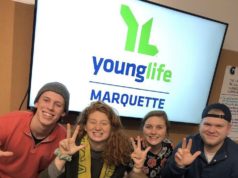 Marquette, MI – 11/17/2019 – This week I sat down with the incredible Jill Grundstrom, an instructor at Northern Michigan University and Director of Dance, CO/LAB COLLECTIVE, and North Coast Dance Festival. Jill is a graduate from NMU with a Bachelor degree in Secondary Education. She then went to New York to receive her Masters in Dance Education from New York University.
Marquette, MI – 11/17/2019 – This week I sat down with the incredible Jill Grundstrom, an instructor at Northern Michigan University and Director of Dance, CO/LAB COLLECTIVE, and North Coast Dance Festival. Jill is a graduate from NMU with a Bachelor degree in Secondary Education. She then went to New York to receive her Masters in Dance Education from New York University.
After attending a production last week entitled What We Leave Behind, a performance addressing climate change through dance, I wanted to know more about how students can get involved in other future performances on campus. Jill answers the questions I have regarding involvement in the arts on campus below.
How did you get involved in NMU’s Theater and Dance program?
After I graduate from NYU, I stayed in New York for a little while afterwards working for American Ballet Theater, and got super burned out from traveling. So I came home, and about that time they needed a new coach for the NMU Dance Team. So that was initially how I got connected back to the university, was through coaching the dance team. Then they offered to have me come and teach some dance classes and it kind of snow balled from there. I was handed the program directorship of dance. So, then I rewrote the program a couple times to get where we wanted it to, and we moved it over here (Thomas Fine Arts) and now we might have a dance major starting next year, actually. The minor officially started in 2012, but we had had dance classes up until then that were just not apart of a program, they were just HP (Health Performance) activity classes. The formalized minor happened in 2012.
How can students get involved in the Theater and Dance programs?
The great thing about our productions is that you do not have to be a major or minor to be involved. Literally anybody from across campus can be involved. We certainly encourage you to consider a major, minor, or certificate program. We have additions for every show at various times throughout the year. The best place for people to keep up to date with everything that we have going on is to check our Facebook and Instagram pages, because everything that we do gets posted to both of those.
What types of students are involved in productions?
Oh my goodness, literally everyone. So, the best example is the lead in our ballet last year is actually a Pre-Med Neuroscience major. So we have people from all over campus. Initially when I first came back here, the captain of the Dance Team was a Construction Management major, who spent the summer working on wind turbines, and I think still actually works for the same company. So we kind of grab people from everywhere. We have people that are criminal justice majors, people that are more involved in psychology and behavior analysis, we have education, digital cinema, and art and design majors as well. There are a lot that have very clear pairings, and then there are some that are not. We are starting to see a few more business or Pre-Law students come on-board with the theater program because they want the theatricality of being able to present. If they’re going to be a lawyer who has to be in court and has to be representing verbally, we’re seeing connections there. We could figure out a way to work ourselves into anything you’re studying.
Why is it important, do you think, to have a theater or dance major/minor, or that you were involved in a production on campus?
The amount of collaboration and creativity that happens in every aspect of the workforce beyond higher education, has continued to grow. There’s not very many positions in this world where you get to just show up, do what you do, then go home. Yes there certainly are. But you definitely have to be able to collaborate, and I think theater and dance, by their nature, usually set you up for those skills. So a great example is what we just did with What We Leave Behind the CO/LAB COLLECTIVE. We worked with 34 people to put that show together, from various different entities on campus where we didn’t always all speak the same language but had to learn how to work through that. Same with theater, every production that we put together has to be a collaboration, from lighting, to sound design, to choreography, to directing, to costuming, to make up. That’s actually what were doing right now, were starting to talk about how that all comes together, and there are like 11 people sitting around the table each coming with ideas on how to put them together. All of those aspects certainly set you up for success in whatever it is you’re going to do. An example is we have an elementary education student in my dance improvisation class right now, seemingly very unconnected subjects, however when you’re in control of an elementary classroom and your kids are losing their minds and you’re trying to figure out what to do, or how can you speak to them on a different level, I think using some of those improvisation techniques can certainly help you start to think outside of the box and start to think in a different way if you already have that pattern to go “well this is what I would typically do, but what happens if I make the opposite choice. How are my students going to be affected?” Same of course with theatrical improvisation, being able to kind of move on the fly, in whatever you’re doing is really important.
What are some upcoming projects the students can get involved in?
We have A Christmas Story coming up, which is half university half community production, but I know they’re always looking for people to help build sets. Also, ushering for the productions by handing out programs because typically you can come in and see the production for free, which is super awesome. For Cats we have a very ambitious set and some very ambitious costumes designs. We are going to be auditioning for that as well coming up here the beginning of December 6th and 7th, I believe. Also we have auditions for a play in The Black Box called Significant Other, which will also be really fun. It’s really cool too in The Black Box because it’s a smaller space so you kind of have to be a little more creative with how you use it. Then we’ll have our summer season, and those auditions are open to everybody, and actually the people that are in those shows and working on the shows are all paid. So we have The Wedding Singer, Billy Elliot, and Rock of Ages. A Christmas Story is community and NMU students. Cats is only for NMU students.
Are there any projects that the theater group here, and dance minors, are involved in outside of NMU in the community?
We have two of our dance minor students choreographing Frozen Junior right now for the Youth Theater, which has been great. One of our students is actually their stage manager as well. So we do have some students that are connecting to the youth theater to get some more practical experience, which we are so lucky to have that opportunity. We have more students that will work on the next youth theater show too. We have such an ambitious schedule of 10 shows a year now, we have plenty of opportunities for our students to be able to be involved in productions.
Anything else you want to add about the theater or dance programs?
Stay tuned for new programming, cause it sounds like we will likely have a BFA in Musical Theater, which will be audition based. We’ll have a BA in Dance, and we’ll also have a BFA in Theater Tech and Design. As long as they’ll pass through the senate I think we are on that track. So that will be exciting!
If you have ever thought about joining a production here at NMU, I hope this interview answered any questions you had about programs on campus. If you have the opportunity to attend future productions at NMU I highly suggest it. The tickets are affordable, and sometimes free (or close to it) if you’re an NMU student.
If you want to view a full list of future productions at Forest Roberts Theater click here!
Check out my other interview on The Weekly Talk.










